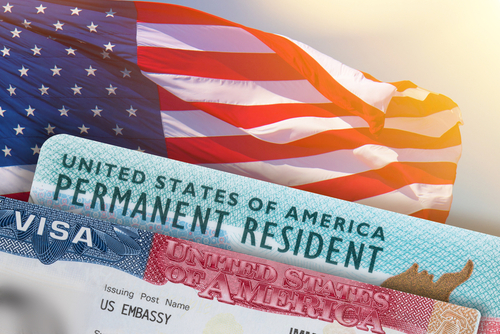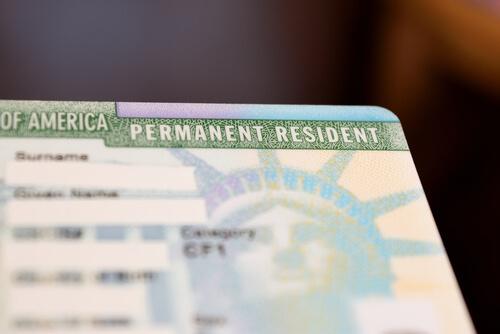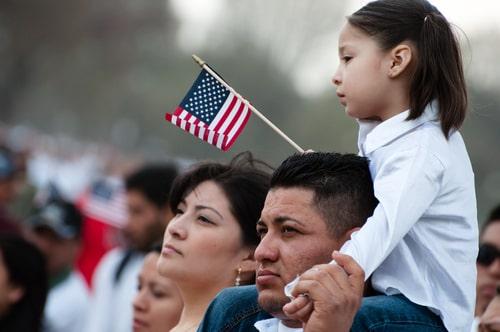Recent Blog Posts
Can I Stay in the U.S. if My Baby Is Born in America?
 If a child is born on U.S. soil, they are automatically granted U.S. citizenship by virtue of the "birthright citizenship" principle enshrined in the 14th Amendment to the U.S. Constitution. This means that the child becomes a U.S. citizen regardless of the immigration status of their parents. This legal provision has significant implications for families who may be in the U.S. without proper documentation or on temporary visas.
If a child is born on U.S. soil, they are automatically granted U.S. citizenship by virtue of the "birthright citizenship" principle enshrined in the 14th Amendment to the U.S. Constitution. This means that the child becomes a U.S. citizen regardless of the immigration status of their parents. This legal provision has significant implications for families who may be in the U.S. without proper documentation or on temporary visas.
Mothers who are thinking about or have already given birth in the United States need to establish their right to stay in the country. This involves submitting an application for a Green Card or another suitable visa. You need a skilled Texas immigration attorney to help you.
Could My Child Sponsor Me?
One of the immediate benefits of having a child born in the U.S. is that it can provide a sense of security for the parents, as their child is a U.S. citizen and entitled to all the rights and privileges that come with it. This includes access to education, healthcare, and social services. Additionally, as U.S. citizens, these children can sponsor their parents for lawful permanent residency (Green Cards) once they turn 21, provided they meet certain eligibility criteria.
Does a Criminal Record Impact Becoming a U.S. Citizen?
 In Texas, having a criminal record can indeed impact your journey toward obtaining U.S. citizenship. The seriousness of your past offenses plays a crucial role. Certain crimes, like murder, sexual assault, and drug trafficking, can create a permanent barrier to establishing good moral character for citizenship. Becoming a U.S. citizen is a challenging process, and it is important to take it seriously. Demonstrating good moral character is also vital, and this can be influenced by your past criminal convictions. If you have a criminal conviction you need a Texas immigration lawyer to help you understand how it can affect your application for U.S. citizenship.
In Texas, having a criminal record can indeed impact your journey toward obtaining U.S. citizenship. The seriousness of your past offenses plays a crucial role. Certain crimes, like murder, sexual assault, and drug trafficking, can create a permanent barrier to establishing good moral character for citizenship. Becoming a U.S. citizen is a challenging process, and it is important to take it seriously. Demonstrating good moral character is also vital, and this can be influenced by your past criminal convictions. If you have a criminal conviction you need a Texas immigration lawyer to help you understand how it can affect your application for U.S. citizenship.
Could a Sex Crime Affect My Immigration Status?
 Immigration is targeting convicted sex offenders in the United States and has arrested nearly 140 noncitizen offenders. If you are convicted of a sex crime, you could be deported and banned from returning to the U.S. It is crucial to grasp how such a conviction can create an adjustment of status when it comes to immigration. You need an experienced immigration attorney to help you figure out your options and who will act fast.
Immigration is targeting convicted sex offenders in the United States and has arrested nearly 140 noncitizen offenders. If you are convicted of a sex crime, you could be deported and banned from returning to the U.S. It is crucial to grasp how such a conviction can create an adjustment of status when it comes to immigration. You need an experienced immigration attorney to help you figure out your options and who will act fast.
What Are the Potential Consequences of Your Immigration Status?
The Immigration and Nationality Act outlines repercussions for those convicted of moral turpitude crimes, including sex crimes and aggravated felonies like rape, child pornography, and sex with a minor. Also, if you end up in ICE custody, deportation officers will assess whether to initiate removal proceedings. Keep in mind that noncitizens are entitled to due process in immigration courts, presided over by federal immigration judges.
How Can I Become a Naturalized Citizen?
 Getting U.S. citizenship through naturalization may seem like a daunting task, especially if you are doing it alone. The good news: If you have any questions about the process or need help with the paperwork, the team at Law Office of Jae Lee is here to help and guide you. A Texas lawyer who has a strong understanding of U.S. immigration and naturalization laws is key.
Getting U.S. citizenship through naturalization may seem like a daunting task, especially if you are doing it alone. The good news: If you have any questions about the process or need help with the paperwork, the team at Law Office of Jae Lee is here to help and guide you. A Texas lawyer who has a strong understanding of U.S. immigration and naturalization laws is key.
Why Is it Better to Have an Immigration Attorney?
It is always a good idea to talk to an attorney who can explain the law in terms that you can understand. There are several key time frames that must be met among other requirements. Under federal law to apply for citizenship, here are some things you should keep in mind:
Can My Significant Other Sponsor Me to Come to The United States?
 There is a way for your girlfriend or boyfriend to come to the United States under what is called the Visa Waiver Program, but they can only stay here for up to three months without a visa. However, if your relationship is more serious and you have plans to get married, you may bring your loved one to the United States with a fiancé visa. The paperwork and immigration laws can be confusing, so having a skilled Texas attorney will help.
There is a way for your girlfriend or boyfriend to come to the United States under what is called the Visa Waiver Program, but they can only stay here for up to three months without a visa. However, if your relationship is more serious and you have plans to get married, you may bring your loved one to the United States with a fiancé visa. The paperwork and immigration laws can be confusing, so having a skilled Texas attorney will help.
Who Can Qualify for the Visa Waiver Program?
The Visa Waiver Program is basically a program that allows people who want to come to the U.S. on business or for tourism without having to get a visitor visa. It is the easiest way for your boyfriend or girlfriend to come visit. However, only citizens from 38 countries are allowed to travel to the U.S. under this program.
What Can I Do If I Want to Marry My Foreign Boyfriend or Girlfriend?
If you are a U.S. citizen who wants to marry a foreigner, getting a visa before marriage usually makes the immigration process faster. For the government to issue a visa, there must be an advantage for Uncle Sam. For example, enrolling in school and paying international tuition would weigh in your favor as it shows you are supporting the country’s educational system.
Can I Help Relatives Who Are Part of the Caravan Coming to the United States?
 You may have seen the images of thousands of migrants marching through Mexico to reach the U.S. border. Some of them may be your relatives, and you may be wondering if you can help sponsor them. In the United States, there are rules about who can bring family members from other countries to live with them, which is the focus of family-based immigration. If you are a U.S. citizen or if you are a permanent resident, you can help some of your family members come to the U.S. through special family visas. You can apply for these visas as long as you meet all the legal requirements. You need a Texas immigration attorney to help you if you hope to reunite with your loved ones.
You may have seen the images of thousands of migrants marching through Mexico to reach the U.S. border. Some of them may be your relatives, and you may be wondering if you can help sponsor them. In the United States, there are rules about who can bring family members from other countries to live with them, which is the focus of family-based immigration. If you are a U.S. citizen or if you are a permanent resident, you can help some of your family members come to the U.S. through special family visas. You can apply for these visas as long as you meet all the legal requirements. You need a Texas immigration attorney to help you if you hope to reunite with your loved ones.
What Paperwork Is Needed to Sponsor a Relative?
It is common for migrants outside of the United States to have relatives already in the country who want to help them. When this is the case, they may pursue a family-based immigration case. The family member can begin by submitting a "Petition for Alien Relative" to the U.S. Citizenship and Immigration Services. If the petition is accepted, the family can then apply for the proper visas. When an immigrant visa gets the green light, the migrating party may apply for a permanent residency card.
What Does it Mean for Someone to Be Deemed Inadmissible In Immigration Law?
 Inadmissibility is a critical concept in immigration law that determines whether an individual can enter, stay, or gain lawful status in a country. Being deemed inadmissible, which is another word for prohibited, can have significant implications on a person’s immigration journey. Today, we will explore what it means for someone to be admissible. If you have been deemed inadmissible in the United States, contact an experienced immigration attorney for help now.
Inadmissibility is a critical concept in immigration law that determines whether an individual can enter, stay, or gain lawful status in a country. Being deemed inadmissible, which is another word for prohibited, can have significant implications on a person’s immigration journey. Today, we will explore what it means for someone to be admissible. If you have been deemed inadmissible in the United States, contact an experienced immigration attorney for help now.
Understanding Inadmissibility
Inadmissibility refers to the legal grounds that make a person ineligible for entry, lawful status, or specific benefits in a country. Immigration laws and regulations set these grounds and vary from one area to another. Common reasons for being deemed inadmissible may include:
-
Criminal convictions
Is Immigrating to the United States Easier or Harder When Children Are Involved?
 The decision to immigrate to the United States is often driven by a desire to build a better life for oneself and one's children. However, the question of whether immigrating to the United States is easy or hard becomes more complex when children are involved. Today, we will explore some factors that can impact the immigration process when children are part of the equation. If you and your family are looking to move to the United States, contact an immigration attorney today to ensure your and your family's rights can be protected throughout the immigration process.
The decision to immigrate to the United States is often driven by a desire to build a better life for oneself and one's children. However, the question of whether immigrating to the United States is easy or hard becomes more complex when children are involved. Today, we will explore some factors that can impact the immigration process when children are part of the equation. If you and your family are looking to move to the United States, contact an immigration attorney today to ensure your and your family's rights can be protected throughout the immigration process.
Family-Based Immigration
One of the primary pathways for immigration to the United States is through family-based immigration. In this context, having children can influence the immigration process in several ways:
-
Additional visa categories – Children of U.S. citizens who are under the age of 21 may be eligible for immediate relative visas, such as the IR-2 (child of U.S. citizen) visa. This can streamline the immigration process and expedite their entry into the United States.
The Essential Guide to Green Cards in Immigration Law
 Immigration law can be complex, and understanding the nuances surrounding green cards – officially known as permanent resident cards – is crucial for any individual aspiring to build a life in the United States. Today, we will explore the most important aspects of green cards, including eligibility requirements, the application process, maintaining permanent residency, and potential benefits and limitations. For legal guidance through this process, make sure to contact an immigration lawyer to ensure you understand the process moving forward.
Immigration law can be complex, and understanding the nuances surrounding green cards – officially known as permanent resident cards – is crucial for any individual aspiring to build a life in the United States. Today, we will explore the most important aspects of green cards, including eligibility requirements, the application process, maintaining permanent residency, and potential benefits and limitations. For legal guidance through this process, make sure to contact an immigration lawyer to ensure you understand the process moving forward.
Eligibility Requirements
To obtain a green card, individuals must meet specific eligibility criteria outlined by the U.S. Citizenship and Immigration Services (USCIS). These requirements typically involve having an immediate family member or an employer in the United States who sponsors the application. Additionally, a certain level of education, skills, or financial status may be necessary, depending on the visa category.
Tips for Immigrating to the U.S. With Children
 Moving with your children within your own home country can be stressful enough. Many children respond negatively to moves, at least until they are able to get acclimated to their new living environment. If you are considering immigrating to the United States with your minor children, there are a few important ways you can help them make the transition while making the move easier for yourself as well. Immigration to the U.S. is often a very complicated affair. There is quite a bit of paperwork to be done and there are quite a few records you are likely to need, such as your children’s birth certificates and passports. It is better to begin talking to your children about your plan to immigrate early on so that they can begin getting used to the idea. An attorney can help work to make your legal journey towards immigration as smooth as possible.
Moving with your children within your own home country can be stressful enough. Many children respond negatively to moves, at least until they are able to get acclimated to their new living environment. If you are considering immigrating to the United States with your minor children, there are a few important ways you can help them make the transition while making the move easier for yourself as well. Immigration to the U.S. is often a very complicated affair. There is quite a bit of paperwork to be done and there are quite a few records you are likely to need, such as your children’s birth certificates and passports. It is better to begin talking to your children about your plan to immigrate early on so that they can begin getting used to the idea. An attorney can help work to make your legal journey towards immigration as smooth as possible.
Helpful Tips for Moving to a New Country With Minor Children
Children are generally quite adaptable. While they may initially be upset about leaving their home country, they will likely adapt to their new living environment rather quickly. Parents planning to immigrate to the U.S. with their minor children should consider tips including:






